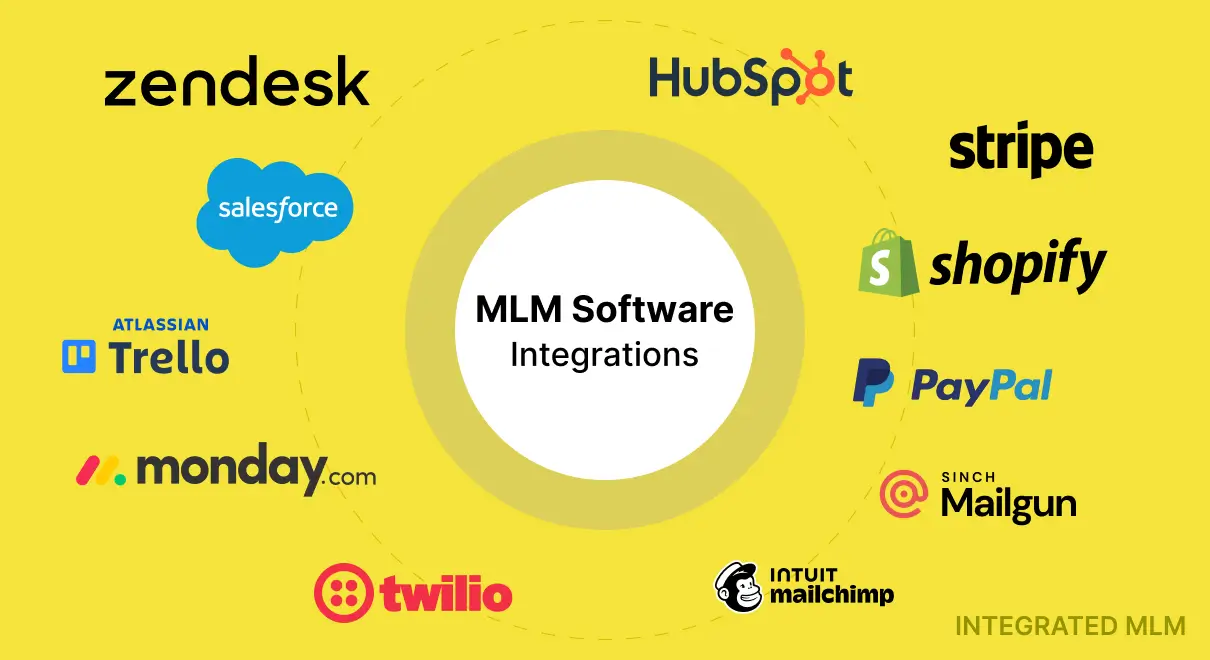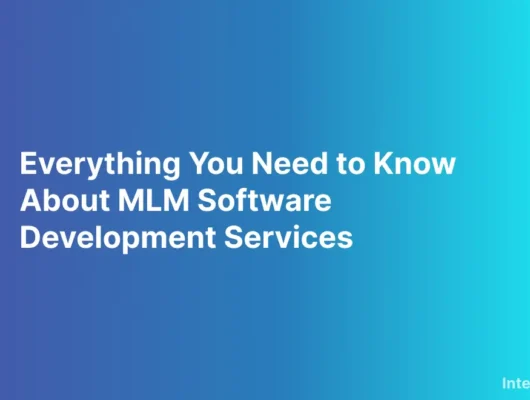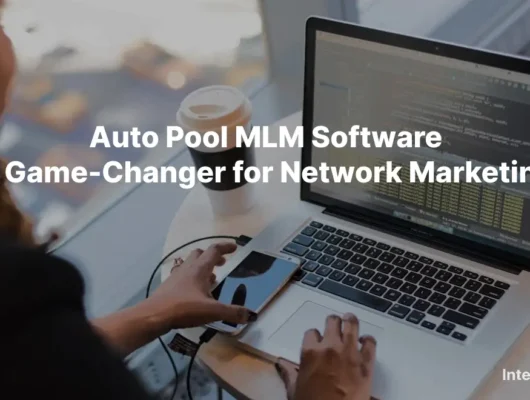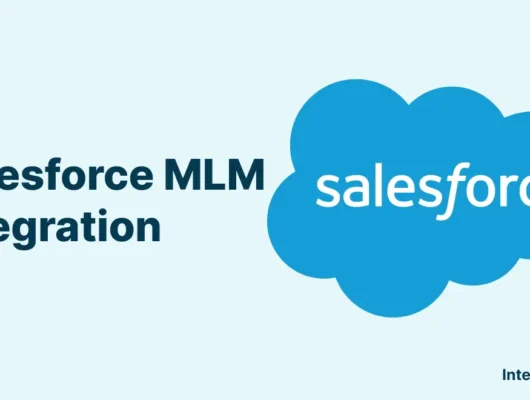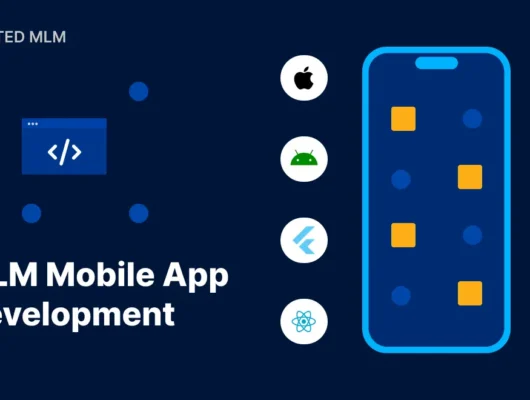Just as Luccock wisely said, “You can never whistle a symphony”; it takes a whole orchestra to conduct a full-fledged concert! Versatility and collaboration are the keys that can turn average network marketing software into a one-stop destination orchestrating numerous business needs. This can be achieved through MLM Software Integration.
No one can whistle a symphony. It takes a whole orchestra to play it. – H.E. Luccock
An MLM Software is the cornerstone of any modern MLM business strategy. However, different functions of direct selling businesses are handled by different software platforms, such as Salesforce for customer relationship management, PayPal for creating a secure payment gateway, and Zendesk for a robust customer support system. Having to go back and forth between all these different software solutions makes it difficult to manage data, projects and workflows.
So integrating the software solutions with mlm software ensures a smooth flow of data and offers a comprehensive solution for your business needs.
In this blog we will look into the finer realities of integrating different platforms with your MLM Software.
Table of Contents
Benefits of MLM Software integration
Network Marketing Software Integration comes with numerous advantages such as:
Data consistency:
Let’s say you are the person entering the required business data into various software solutions that you use. The very fact that data is being entered manually opens a box of errors. The data entered under different software solutions can be different, the data fields of each software might be different, and there is an overall inconsistency shadowing the process.
To avoid the possibility and inconsistency of manual errors and to improve data accuracy and holistic data processing, Direct Selling Software Integration is inevitable.
Streamlined workflow:
Rather than jumping between several software solutions that serve different purposes, and having no interconnection whatsoever, integrating different platforms helps you access the business data from one single touchpoint. This touchpoint can be your dearest MLM software, which connects you to all subsidiary solutions as needed.
Integrating your marketing automation platform with other solutions will enhance your business strategy by giving birth to innovative solutions that were not possible before.
For example, with MLM Software Integration, you will be able to automate email campaigns based on customer segmentation, trigger personalized product recommendations based on lead status, and even get a much more comprehensive view of your business by considering data shared between different platforms to generate insights.
Improved customer experience:
To provide a personalized customer experience, there is no better way than having a unified view of your customer across all touchpoints of your venture. This exceptional ability enables you to get the entire history of customer activity, identify any hiccups they may face along the way, and resolve them proactively.
By handing this data over to your customer success department, you can establish a direct relationship between your company and customers to resolve any problems and enhance the reliability of your brand.
Sales and Marketing Effectiveness:
By analysing the trends and nature of customer behaviour across various platforms, distributors can gain insights into the general customer psyche. When a lead is generated through any of the business contact touchpoints, ranging from the website to social media, the data can be used by distributors to get in touch with the lead and nurture it. This enables them to design their market strategy and formulate sales techniques that suit customer preferences.
This allows the MLM venture to cut the slack in achieving customer satisfaction. Sales techniques, marketing campaigns, and sales funnels can be devised to pitch what customers are precisely looking for and create targeted marketing campaigns that resonate with them.
Data-Based Decision Making:
A well-integrated MLM system provides a centralized repository of customer data. This empowers businesses to make data-driven decisions across all departments. This data can be funnelled to identify and forecast trends, make reports and support in making critical business decisions.
Challenges in MLM Software Integration
Every coin has two sides and MLM Software integration is no exception. While there are obvious benefits in integrating the different software platforms that a business uses, there are actual downsides to it as well.
- Data Security and Privacy
- While it is important to integrate the data across multiple systems, this comes with the risk of data breaches. Hence, it is crucial to ensure that all the platforms involved in Direct Selling Software Integration are safe and secure. Safeguarding important business and customer data throughout the process is essential to maintain trust and protect sensitive information.
- Technical Complexity
- For businesses with limited IT resources, the technical aspects of MLM software integration may seem daunting. However, this can be easily overcome with the help of a robust support ecosystem offered by the MLM software vendor. Integrated MLM software offers various integrations with numerous platforms to achieve optimal ease of doing business. Book your free demo today to get further insights.
- Change Management
- Change always invites disruption of varied degrees. If the distributors are unaware and underprepared for the change, and if they are not trained in the essential workflow, they may find it difficult to navigate the new features, rather than finding them helpful. Hence, necessary training should be provided for all users to enhance user adoption and minimize resistance to change.
- Cost of Integration
- The cost of MLM integration varies from project to project depending on the complexity, the number of platforms being integrated, and the integration methods used. It is important to consider these factors while planning and budgeting the integration strategy.
Method of MLM Integration
There are several methods for integrating MLM business software with other platforms. API, or Application Programming Interface, allows you to connect the MLM software with other software solutions or platforms at a deeper level. It offers high flexibility but demands technical know-how.
Our MLM software development company offers Custom API for seamless integration without you having to sweat over the nitty-gritties. We offer Custom API to meet your specific needs for integration and deliver it with the best technical expertise.
A well-defined MLM integration strategy is important to minimize any technical or associated challenges that may arise during integration process of your network marketing software.
MLM Integration Strategy
Having a clear-cut strategy will help you minimize errors and maximize the benefits of integration.
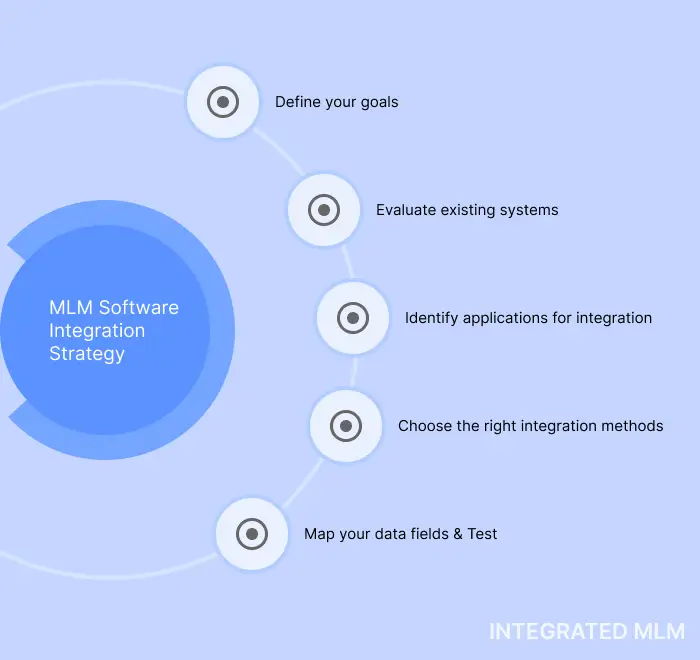
- Define your goals: What do you want to achieve through MLM software integration? Is it to improve the sales strategies and techniques for distributors? Is it to streamline the business operations? Know what you are targeting through Direct Selling software integration. Synchronize your goals with the selection of applications that you integrate with so that it fits your requirements as well as the budget.
- Evaluate existing systems: Take a stock of existing business systems that you are using throughout the process. These can include marketing software, social media platforms, e-commerce platforms, customer service tools, etc. Each of their functionalities must be understood, and they should be used to avoid any data silos that hinder the integration process and holistic view of business data.
- Identify applications for integration: You need not integrate all the business platforms that you use in one single go. Prioritize business applications that crucially help you with the integration goals. Factors such as data overlap, user needs, and efficiency gains must be considered while choosing the software solutions that you prefer integrating. You can always start with some integrations and expand gradually.
- Choose the right integration methods: Integration methods must be chosen according to the level of technical expertise and budget that you intend to work with. With limited IT resources, integration functionalities, and budget, you can opt for simpler native or third-party integrations. However, for enhanced functionality, we offers Custom API integrations without you having to worry about technical drain.
- Map your data fields: Some common errors during integration are data mapping errors and inconsistencies. These occur when matching data fields in one software to another while integrating the data. Ensure that the data definitions and formats are consistent to avoid mapping errors during the integration of various applications.
- Test: To ensure that the data flow is smooth and seamless, and to gain experience after integration, a test run can be conducted for a reasonable period in a sandbox environment before company-wide implementation. This helps to identify any possible hiccups, refine the data mappings, and troubleshoot any issues that may arise.
- Adoption resistance: To minimize resistance to changes in software integration adoption, effective change management strategies can be implemented. Keeping the distributors informed about the changes and highlighting the benefits and functionalities are important steps to minimize resistance.
Top Software Integrations for MLM Businesses
Some top software integrations for Network Marketing are as below:
CRM Software:
CRM software are the key for managing customer relationships and growing your business. With CRM MLM software, you get powerful tools specifically designed for MLM businesses.
- Salesforce: The number of third-party integrations, add-ons, and functionalities makes Salesforce an unrivalled CRM solution in the market.Its intuitive and easy-to-understand interface, combined with Salesforce MLM integration, also enables faster adoption.
- HubSpot: HubSpot provides an easy-to-navigate, easy-to-create platform with smooth landing pages, forms, and emails, which work in a drag-and-drop format. The ease of driving campaigns with bulk creation and scheduling features is a cherry on top of the unified business experience it provides.
- Zoho CRM: With an intuitive and easy-to-use interface, Zoho offers numerous paid and free plans for Customer Relationship Management needs. It comes with a handy mobile application that gives quick access to contacts, leads, and deals.
E-commerce Platforms:
Explore top e-commerce platforms like Shopify, WooCommerce, and Magento, each offering unique advantages for businesses, including seamless integration with ecommerce MLM software to enhance online sales and marketing strategies.
- Shopify: Besides its popularity and market acceptance, Shopify is an ecommerce website builder that enables easy creation and management of online stores. With Shopify MLM integration, it allows selling products across various outlets, starting from your own website to social media platforms and popular online marketplaces.
- WooCommerce: For small and medium enterprises, WooCommerce is a well-suited e-commerce platform. However, it can also be customized for large stores. It is a highly scalable and customizable platform that allows businesses to tailor their stores to their specific needs.
- Magento: It is an affordable and fast e-commerce platform that allows customization to meet unique business needs. It offers full control over the look, content, and functionality of the store to the client.
Payment Gateways:
When choosing the right payment gateway, seamless integration is key for smooth transactions. Explore top payment gateway integrations that offer secure, versatile, and efficient solutions for your business needs.
- PayPal: PayPal is one of the most popular, secure, and accessible payment gateways with large market acceptance. It enables smooth payments with accurate tracking, merchant services, and fraud protection.
- Stripe: With the versatility of over 135 currencies and automatic foreign conversions, Stripe is the choice for cross-border payments and international payouts in preferred currency.
- Authorize.Net: By making electronic and card payments in person, online, and over the phone easier, Authorize.Net enables businesses to improve their versatility in payment modes.
Customer Support Systems:
- Zendesk: Zendesk is an excellent platform to manage customer queries and address them promptly. Its ability to manage customer queries in various formats such as social media messages, phone calls, or live chats enables businesses to boost customer engagement and improve brand reliability.
- Freshdesk: The advanced metrics, charts, and analytics that Freshdesk offers in terms of customer engagement are unparalleled. In order to improve the key performance indicators or KPIs and customer satisfaction, this critical information is used.
- Help Scout: With numerous features augmented by AI, Help Scout has emerged as a magic wand for customer service, aiding in crafting better replies and addressing common queries efficiently and faster.
Accounting Software:
- QuickBooks: It is a powerful customer-oriented software that streamlines accounting, tracking, and reporting, along with guaranteed management of a company’s finances, even in the absence of a big accounting department.
- Xero: Xero is designed to automate complex accounting tasks from reconciling bank transactions to sending invoice reminders. With a secure data storage environment, the platform enables businesses to track their finances in collaboration with their accountant.
- FreshBooks: With innovative features such as instant invoicing and tracking, FreshBooks is suitable for a variety of business niches, from freelancers and self-employed professionals to contractors and typical large businesses.
Social Media Management Tools:
- Hootsuite: It helps create compelling content and stories, along with an optimal scheduling system to target the right audience and enhance engagement.
- Buffer: With Buffer, social media managers can connect with all major platforms from one place, enabling them to consolidate information and track progress in one go.
- Sprout Social: By tracking metrics from various social media platforms related to reach, impressions, growth, and engagement, Sprout Social helps brands customize their strategies and enhance visibility with data-based quality insights.
Email Marketing Platforms:
- Mailchimp: With world-class technology and tools, Mailchimp enables customers to launch a business vision, drive it, and share it across their prospects.
- Constant Contact: For accessible marketing automation, e-commerce, and social media integration, Constant Contact provides various AI-assisted tools.
- ActiveCampaign: To manage contacts, leads, and streamline deals, ActiveCampaign streamlines efforts through powerful automation, lead scoring, and pipeline management.
Tips for a Successful MLM Integration:
To successfully integrate MLM solutions, one must start small by integrating just the essential software tools and scale gradually. The investment should be in data quality and avoiding any errors during integration. Using corrupt data and shabby transferring across various platforms may defeat the purpose.
Data must be monitored and synchronized promptly and constantly refined to avoid any errors that may snowball in the future. Proper communication with different teams and software support is important for a seamless integration process. Distributors must be aware of the benefits of integration to avoid any resistance to change.
Conclusion
A wealth of benefits awaits an MLM venture that has invested in software integration with other applications. A well-integrated software cultivates stronger business relationships within the venture as well as with customers.
As the MLM business industry evolves and technology advances, integration strategies must be constantly refined and innovated to accommodate solutions for newer challenges. This optimization will undoubtedly give your Network Marketing business an advantage over others.
Frequently Asked Questions
How long does the integration process take?
Depending upon the complexity of the MLM integration, the number of applications being integrated, and the method of integration, the time-frame can vary. Simple integrations can be completed within days, but complex ones may take several weeks or months.
How much does it cost for Direct Selling Software Integration?
Depending on the involvement of external business consultants, the complexity of the project, and the integration method, the cost may vary. Native and third-party integrations are cheaper than API integrations. The cost of maintenance and data migration must also be considered when budgeting for software integration.

